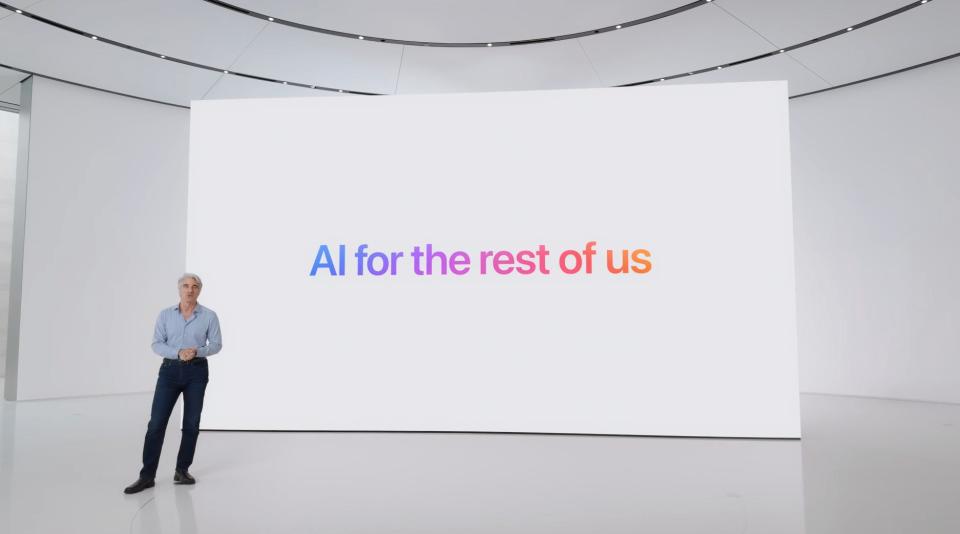Tim Cook's message is clear: Apple is doing AI on its own terms
The AI boom has been nonstop in Silicon Valley.
Apple is finally ready to do AI "for the rest of us."
The iPhone maker unveiled its vision of AI at WWDC, showing it's doing things on its own terms.
When Apple released the first Macintosh in 1984, its message was simple: this was "the computer for the rest of us."
An early ad carrying the slogan contrasted the awkward heft of an IBM computer with Steve Jobs's sleeker vision for personal computers, suggesting that Apple had its own way of doing things that would always be better than the competition.
Its message is no different in the AI era.
At its Worldwide Developers Conference keynote in Cupertino on Monday, Apple finally revealed Apple Intelligence — its vision for generative AI across its devices — as "AI for the rest of us."

It did so for a few reasons. For one, generative AI has been around for some time, and Apple has no reason to pretend that it hasn't been.
A who's who of Apple's biggest rivals, including Microsoft, Meta, and Google, have all rushed to make AI their top priority in a bid to get ahead on a technology that Bill Gates has described as "revolutionary" since the launch of ChatGPT.
During that time, Apple remained largely mute, raising concerns among backers that it might have been caught off guard by the sudden pivot to generative AI.
After all it was already busy trying to crack a whole new area of virtual reality computing with the Vision Pro.
But those following history will have known that Apple likes to do things on its own terms, which is precisely why it branded its approach to Silicon Valley's most-hyped technology as "AI for the rest of us."
So, what does that look like, exactly? Well, there's no fundamental difference between what Apple showed off on Monday and what its competitors have revealed already.
In unveiling "Apple Intelligence," Apple CEO Tim Cook emphasized that Apple's AI would be powerful, intuitive, integrated, personalized, and private. "Together, all of this goes beyond artificial intelligence — it's personal intelligence," he said.
Here's the thing. Apple's AI isn't the most powerful on the market. As Wharton associate professor Ethan Mollick noted on X, Apple's newly introduced on-device AI model is about as powerful as the tiny models put out by its rivals.
Apple AI on device is equivalent to other tiny models.
Apple AI Server is equivalent to GPT-3.5ish
Frontier models they are not, but will still give you supercharged Siri & okay-ish writing help. I don’t think this has much to do with high-end use cases. https://t.co/wAiSz2OB5S pic.twitter.com/FtWzraHn9s— Ethan Mollick (@emollick) June 11, 2024
Apple is also relying, in part, on another company for integration, having announced a partnership with ChatGPT maker OpenAI. That partnership integrates OpenAI's technology into Apple's operating systems, allowing users to opt in to use ChatGPT on iPhones, for example.
In a way then, none of this is radically new. Apple had no new powerful AI model to show off that blows its competitors out the water on performance benchmarks. Companies such as Google have already been working on intuitive AI use with features like "Circle to Search."
But with more than two billion active devices globally, Apple knows it has a huge install base waiting for it to deliver its own, Apple-packaged version of AI to users.
Apple is doing AI for them.
Read the original article on Business Insider


